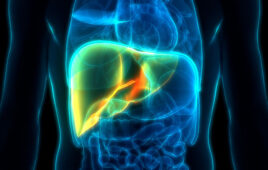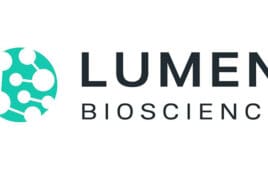
Alex Zhavoronkov, Ph.D.
Capping off a busy 2023, Insilico Medicine has announced a potentially first-in-class oral PHD inhibitor for the treatment of inflammatory bowel disease (IBD). ISM5411 is the fifth AI-backed drug candidate from Insilico Medicine to reach clinical stages.
ISM5411 targets prolyl hydroxylase domain (PHD) enzymes via modulation of the hypoxia-inducible factor (HIF) pathway, which is involved in cellular response to low oxygen levels. By inhibiting PHD, ISM5411 aims to stabilize HIF, thereby enhancing the expression of genes that help protect the gut lining and reduce inflammation.
AI’s role in ISM5411’s development
To develop ISM5411, InSilico tapped its AI platform, Pharma.AI. This involved deploying Chemistry42, a generative AI engine, which created the structure-based small molecule based on the PHD target protein structure. “After obtaining a series of lead compounds with novel structures, unique binding modes, and excellent activity, Insilico’s R&D team engaged in further medicinal chemistry optimization and transformation,” said Alex Zhavoronkov, Ph.D., founder and co-CEO of Insilico Medicine. “They ultimately nominated ISM5411 — an oral PHD-specific inhibitor with intestinal restriction — as a preclinical candidate.”
Target rationale
PHD plays a crucial role in regulating gut barrier protective genes and is significantly upregulated in IBD patients. “Research shows that PHD plays a critical role in regulating the stability and transcriptional activity of HIF-1α, which is responsible for driving the expression of gut barrier protective genes,” Zhavoronkov explained. Because upregulated PHD is closely linked with high levels of inflammatory cytokines, it is a promising target for treating IBD.
Traditional drugs targeting PHD, which are used in the management of chronic kidney disease and anemia, come with a risk of systemic side effects. Insilico Medicine developed ISM5411 to sidestep such off-target effects by acting on the gut directly — the target organ of IBD. “This gives them a higher safety profile than other products in development,” Zhavoronkov said.
Mechanism of action
ISM5411 exhibits both anti-inflammatory activity and promotes mucosal repair. This differs from conventional IBD treatments that primarily focus on suppressing inflammation. As a result of immunosuppression, with long-term use, patients taking the drug may face an elevated risk of chronic infection and carcinogenesis. The potentially first-in-class, oral, thus promises “a number of potential advantages both to existing therapies and those in development,” Zhavoronkov explained.
Preclinical studies have shown ISM5411 to be intestinal restrictive, thus curbing systemic exposure. “As an oral treatment, it’s more convenient and easier to administer than injection-based treatments, which is expected to improve patient compliance,” Zhavoronkov said.
By targeting intestinal mucosal repair, Insilico Medicine is optimistic that it will ultimately improve long-term clinical prognosis. “In addition, ISM5411 is expected to directly regulate the intestinal immune microenvironment, providing a new mechanism of treatment,” Zhavoronkov added.
Clinical trials for ISM5411
Phase I trials in Australia are evaluating the safety and tolerability of ISM5411 in healthy volunteers. The primary endpoints are pharmacokinetics and pharmacodynamics, with results expected by the end of 2024.
“The first two dose groups of single ascending dose (SAD) have been completed and a third dose group of 200 mg subjects has also been completed,” Zhavoronkov said. “We plan to collate and lock the clinical trial data following the completion of the trial in all dose groups and expect to receive results before the end of 2024 and will update the progress of the ISM5411 program in real time on the clinical trial website (NCT06012578).”
The company is also planning Phase Ib trials to further assess ISM5411. “In Phase Ib, we’ll be evaluating the pharmacokinetics and pharmacodynamics of multiple doses of the drug, looking at safety and tolerability via evaluation of blood and other fluids before initiating broader studies with patients,” Zhavoronkov said.
The role of Pharma.AI
In addition to Insilico’s Pharma.AI platform having helped identify a string of clinical-stage candidates for the company, more than 40 other pharmaceutical companies have adopted the platform. For Insilco, it has yielded an internal pipeline of 31 therapeutic assets across 29 targets, including in cancer, fibrosis, and central nervous system diseases.
“Our lead drug, for idiopathic pulmonary fibrosis, is the first drug with both an AI-discovered target and designed by AI to reach Phase II trials with patients,” Zhavoronkov said.
Rounding out its AI-developed clinical-stage assets is a potentially best-in-class USP1 cancer inhibitor for BRCA-mutated tumors in Phase I that was recently licensed to Exelixis for $80 million upfront and additional milestone and royalty payments. “We also have a novel treatment for COVID and related variants — a 3CL protease inhibitor – in Phase I, and a QPCTL novel immunotherapy treatment in Phase I,” Zhavoronkov added.
Filed Under: Gastroenterology



